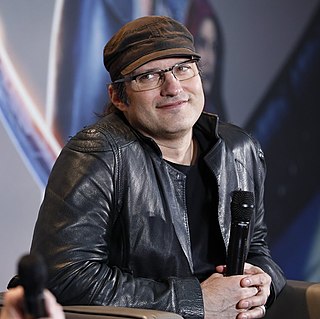Ein Zitat von Kevin Mitnick
Der Begriff wurde jahrzehntelang verwendet, um talentierte Computer-Enthusiasten zu beschreiben, Menschen, deren Fähigkeit, Computer zur Lösung technischer Probleme und Rätsel zu nutzen, von anderen mit ähnlichen technischen Fähigkeiten respektiert und bewundert wurde – und wird.
Verwandte Zitate
Wir brauchen Führungskräfte, die technische Themen respektieren, auch wenn sie keinen technischen Hintergrund haben. In vielen US-Branchen, darunter Automobil- und sogar Computerbranche, betrachten viele Manager Technologie nicht als Kernkompetenz, und diese Einstellung führt dazu, dass sie technische Themen außen vor lassen.
[Unternehmensprogrammierung] wird oft so weit durchgeführt, dass der Einzelne völlig in die Unternehmenskultur eintaucht und keine Möglichkeit mehr hat, einzigartige Talente und Fähigkeiten zu entfalten. Unternehmenspraktiken können Personen mit außergewöhnlichen Fähigkeiten und Initiative in technischen Angelegenheiten direkt feindselig gegenüberstehen. Ich halte ein solches Management von Technikern für grausam und verschwenderisch.
Sehr talentierten Technikern fällt es oft außerordentlich schwer, den Standpunkt der Kunden einzunehmen, die sich oft nicht mit der Technologie auskennen und möglicherweise starke und möglicherweise falsche Vorurteile ihr gegenüber hegen. Die Techniker glauben vielleicht tief im Inneren, dass sie besser wissen, was Kunden brauchen „sollten“. Kunden haben natürlich eine andere Sichtweise. Sie wollen Produkte, die Kundenprobleme lösen und andere Kundenvorteile bieten, und das ohne übermäßige Risiken oder Kosten. Nicht selten betrachten Kunden fortschrittliche Technologie selbst als Risiko.
Ich verstehe nicht wirklich, warum nicht jeder Regie führen will. Es ist eine absolut faszinierende Kombination aus erforderlichen Fähigkeiten und Rätseln auf allen möglichen emotionalen, praktischen und technischen Ebenen. Es erfordert eine so große Vielfalt an Fähigkeiten. Ich finde es völlig fesselnd.
Ich habe von Geburt an mit Computern zu tun gehabt; Wir hatten einen der ersten Macs, der kurz vor meiner Geburt auf den Markt kam, und mein Vater leitete eine Firma, die Computerbetriebssysteme schrieb. Ich glaube nicht, dass ich über besondere technische Fähigkeiten verfüge. Ich habe gerade einen wirklich großen Vorsprung.
Menschen versuchen seit Jahrzehnten, eine Art natürliche Sprachverarbeitung mit Computern durchzuführen, und im Allgemeinen wurden dabei nur langsame Fortschritte erzielt. Es stellte sich heraus, dass das Problem, das wir lösen mussten, sozusagen das Gegenteil des Problems ist, das die Leute normalerweise lösen müssen. Die Leute müssen normalerweise das Problem lösen, dass Sie, wenn Sie Tausende oder Millionen Textseiten kennen, den Computer dazu bringen müssen, dies zu verstehen.
Da der Arbeitsplatz immer spezialisierter wird, von Büros über medizinische Zentren bis hin zu Fabriken, müssen Teams von Menschen ihre Arbeit durch Zusammenarbeit erledigen. Für meine Arbeit im Filmemachen brauchen wir talentierte Menschen mit technischen Fähigkeiten, aber ihre Fähigkeiten zur Kommunikation und Zusammenarbeit mit anderen sind ebenso wertvoll.
Regie zu führen ist der beste Job, den es gibt. Ich verstehe nicht, warum nicht jeder Regie führen will. Es ist eine absolut faszinierende Kombination aus erforderlichen Fähigkeiten und Rätseln auf allen Ebenen – emotional, praktisch und technisch. Es erfordert eine so große Vielfalt an Fähigkeiten. Ich finde es völlig fesselnd. Ich liebe einfach den gesamten Prozess.
Es muss Gruppen von Enthusiasten für alles auf der Erde geben – Fanatiker, die ein Vokabular, eine Menge technischer Fähigkeiten und Ausrüstung und vielleicht eine Vision eines einzelnen Ausschnitts der Schönheit und des Geheimnisses der Dinge, ihrer Komplexität, Faszination usw. teilen Unerwartetheit.
Kein Wissenschaftler wird dafür bewundert, dass er bei dem Versuch scheitert, Probleme zu lösen, die außerhalb seiner Kompetenz liegen. ... Gute Wissenschaftler untersuchen die wichtigsten Probleme, die sie ihrer Meinung nach lösen können. Schließlich ist es ihre berufliche Aufgabe, Probleme zu lösen und nicht nur damit umzugehen.


































